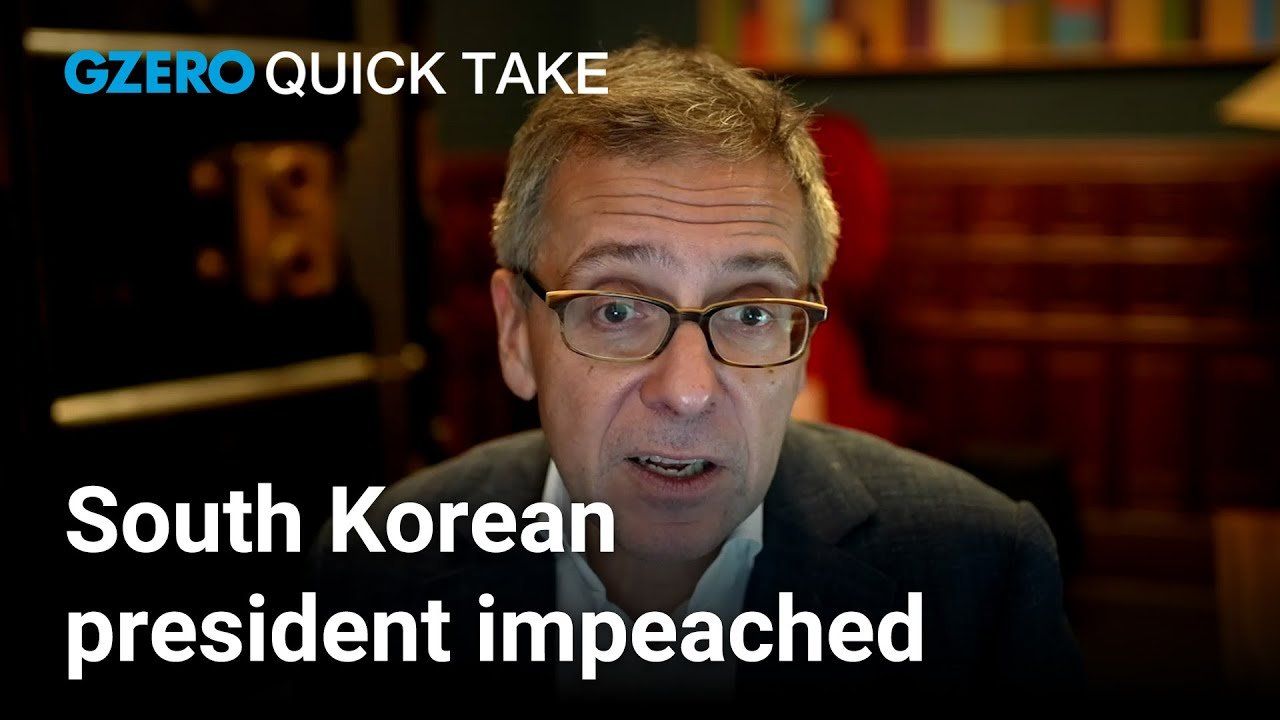December 16, 2024
Ian Bremmer's Quick Take: A Quick Take to kick off your week. The South Korean President, Yoon Suk Yeol has been impeached. Second time the charm, the first time his own party didn't go ahead with it because they wanted to give him the opportunity to resign, himself. He chose not to, shredding what little was remaining of his own personal and political legacy, and now he's out. The party itself basically freed the members of the party to vote their conscience, and many of them did, and that's it. He's now a former president. There's a caretaker government coming in with the prime minister in charge. South Korea's in disarray. They don't have a president. They don't have a minister of interior. They don't have a minister of defense. They don't have a minister of justice. Everything's not occupied and going to have to be, "acting," for a matter of months.
First, you've got to get the constitutional court to rule on this, and that will happen. But there are three absentees that need to be appointed there. Hopefully that all gets done within a matter of weeks, a couple of months, and then after that, when it's upheld the impeachment, then you'll have new elections in a couple of months.
So, I mean, first the bad news. The bad news is that this was a disgrace. It was an active subversion of the South Korean constitution or attempt thereof, and their checks and balances on their president and his approval ratings as he's forced out in the single digits, we're talking Peru president levels almost, at this point. It comes at a bad time. The Japanese have a weak government in coalition, and the United States has a new president coming in with much stronger consolidated power. So if you're South Korea and you need to formulate a response to dealing with America First demands, to spend more money on American troops on the ground, demands to do more, to redress what's seen as a trade imbalance by the incoming President-elect. All of that is really hard to do when you don't have an effective government. That's the bad news.
The good news is that the system worked the way it was supposed to, and both the military, and the judiciary, and the constitutional court, and the parliament, everyone is acting to contain behavior that is off the rails by a sitting executive. And that shows that South Korean democracy is very much functional and representative of its people, much like nearly all of the advanced industrial democracies. The US is the country that is the outlier here. South Korea, not so surprising.
Another piece of bad news is that it's almost certain that the winner, the incoming winner of the next presidential election will be the Democratic Party of Korea, which got the majority in parliament in the last parliamentary elections. And their leader, Lee Jae-myung is frankly not much more popular than outgoing Yoon. It's going to be, he's had his own scandals, electoral scandals that could potentially bring him down depending on how the court, the Supreme Court rules, assuming that that doesn't happen. If it did, it would cause massive instability and lots of people out on the streets demonstrating and the rest. But if that didn't happen, then he's going to be the leader of South Korea and he'll be again, a very weak leader. It'll also be a very weak leader leading the country in a very different direction. This is a party that will actively support the Sunshine policy with North Korea, very different than outgoing former President Yoon. Would support closer ties with their leading trade partner, China. Would question the rapprochement with Japan and would also question a stronger relationship with their defense partner and ally, the United States. So a lot of uncertainty going forward with South Korea.
One other really interesting thing about this whole saga is the role that AI played. Yoon, a deeply unpopular kind of anti-social figure. Very brusque, not an obvious retail politician, but on the campaign trail, developed an AI essentially deep fake Yoon that was training on a lot of his speeches, but better looking and more engaging and more social, and was used extensively on the campaign trail, both to talk about his policies, to engage with individual voters, to hurl insults at the opposition, and even to engage socially. And this was, I mean, AI Yoon was a lot more popular than actual Yoon, and a big piece of why it was that he ended up being elected president. Unfortunately, AI Yoon was not the president that the South Koreans got. They got actual Yoon who turned out to be possibly even less capable than AI Yoon, and we are all very happy to see the back of him.
So that's pretty much the end of this crazy little few-week saga in South Korean politics. We now bring you back to our regularly scheduled program.
More For You
- YouTube
Is Trump permanently redefining the American presidency? On Ian Explains, Ian Bremmer breaks down the political revolution President Trump has launched from the White House.
Most Popular
Think you know what's going on around the world? Here's your chance to prove it.
Pro-government supporters holding a Venezuela's flag attend a rally against U.S President Donald Trump in Caracas, Venezuela August 14, 2017.
REUTERS/Ueslei Marcelino
When they meet at the White House today, Venezuelan opposition leader and Nobel Peace Prize winner María Corina Machado will seek to convince US President Donald Trump that it was a mistake to back Delcy Rodríguez as interim leader of Venezuela.
© 2025 GZERO Media. All Rights Reserved | A Eurasia Group media company.
